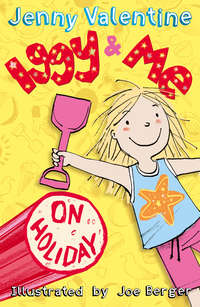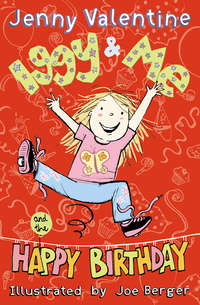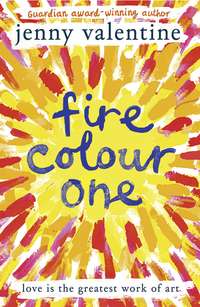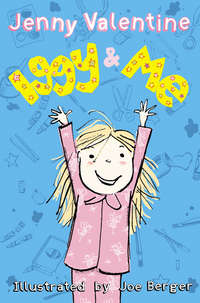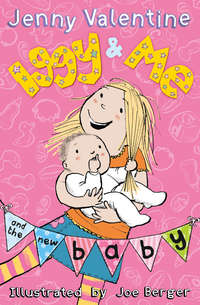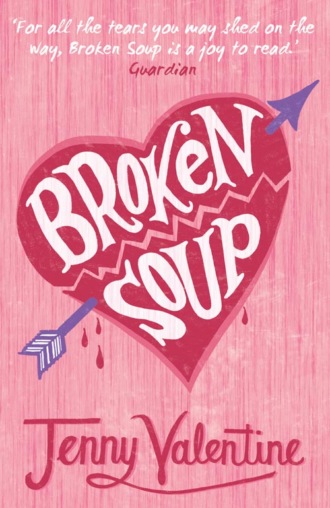
Полная версия
Broken Soup

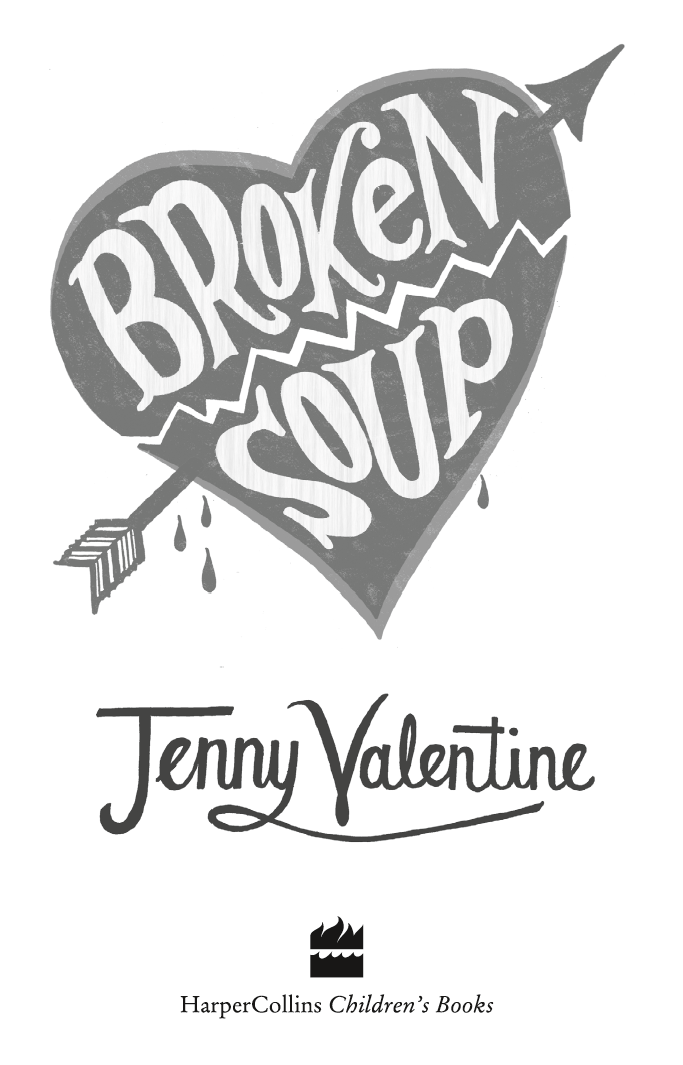
Copyright
HarperCollins Children’s Books An imprint of HarperCollinsPublishers Ltd 1 London Bridge Street London SE1 9GF
www.harpercollins.co.uk
First published in Great Britain by HarperCollins Children’s Books 2008
Copyright © Jenny Valentine 2008
Jenny Valentine asserts the moral right to be
identified as the author of the work.
A catalogue record for this book is available from the British Library
HarperCollinsPublishers has made every reasonable effort to ensure that any picture content and written content in this ebook has been included or removed in accordance with the contractual and technological constraints in operation at the time of publication.
All rights reserved under International and Pan-American Copyright Conventions. By payment of the required fees, you have been granted the non-exclusive, non-transferable right to access and read the text of this e-book on-screen. No part of this text may be reproduced, transmitted, down-loaded, decompiled, reverse engineered, or stored in or introduced into any information storage and retrieval system, in any form or by any means, whether electronic or mechanical, now known or hereinafter invented, without the express written permission of HarperCollins e-books.
Source ISBN: 9780007229659
Ebook Edition © May 2012 ISBN:9780007369638
Version: 2015-03-23
For
Molly and Ella,
Jess and Emma,
and Kate.
All great sisters.
Contents
Cover
Title Page
Copyright
Chapter One
Chapter Two
Chapter Three
Chapter Four
Chapter Five
Chapter Six
Chapter Seven
Chapter Eight
Chapter Nine
Chapter Ten
Chapter Eleven
Chapter Twelve
Chapter Thirteen
Chapter Fourteen
Chapter Fifteen
Chapter Sixteen
Chapter Seventeen
Chapter Eighteen
Chapter Nineteen
Chapter Twenty
Chapter Twenty-one
Keep Reading
Acknowledgements
About the Author
Books by Jenny Valentine
About the Publisher
one
It wasn’t mine.
I didn’t drop it, but the boy in the queue said I did.
It was a negative of a photograph, one on its own, all scratched and beaten up. I couldn’t even see what it was a negative of because his finger and thumb were blotting out most of it. He was holding it out to me like nothing else was going to happen until I took it, like he had nothing else to do but wait.
I didn’t want to take it. I said that. I said I didn’t own a camera even, but the boy just stood there with this I-know-I’m-right look on his face.
He had a good face. Friendly eyes, wide mouth, all that. One of his top teeth was chipped; there was a bit missing. Still, a good face doesn’t equal a good person. If you catch yourself thinking that, you need to stop.
All my friends were cracking up behind me. The girl at the counter was trying to give me my change and everybody in the queue was just staring. I couldn’t think why he was doing this to me. I wondered if embarrassing strangers was one of the ways he got through his day. Maybe he walked around with a pile of random stuff in his pockets – not just negatives, but thimbles and condoms and glasses and handcuffs. I might be getting off lightly.
I didn’t know what else to do, so I said thank you, who knows for what, and I went red like always, and I pulled a face at my friends like I was in on the joke. Then I shoved the negative in my bag with the oranges and milk and eggs, and he smiled.
All the way home I got, “What is it, Rowan?” and “Let’s see” and “Nice smile” – a flock of seagulls in school uniform, shrieking and pointing and jumping around me. And I did my usual thing of taking something that’s just happened apart in my head, until it’s in little pieces all over the place and I can’t fit it back together again. I wanted to know why he’d picked me out of everyone in the shop, and whether I should be glad about that or not. I thought about what he said (you dropped this … no really … I’m sure) and what I did (act like a rabbit in headlights, argue, give in). I was laughing about it on the outside, feeling like an idiot on the quiet. I had no idea something important might have happened.
My name is Rowan Clark and I’m not the same person as I was in that shop, not any more. The rowan is a tree that’s meant to protect you from bad things. People made crosses out of it to keep away witches in the days before they knew any better. Maybe my mum and dad named me it on purpose, maybe not, but it didn’t do much good. Bad things and my family acted like magnets back then, coming together whatever was in the way.
When I got home with the shopping, I forgot about the negative because there was too much to do. Mum was asleep on the sofa while Stroma watched Fairly Odd Parents with the sound off. Stroma’s my little sister. She was named after an island off Caithness where nobody lives any more. There used to be people there until 1961 and one of them was someone way back in my dad’s family. Then there was just one man in a lighthouse, until they made the lighthouse work without the man and he left too. That’s what Stroma and her namesake have in common, getting gradually abandoned.
I made scrambled eggs on toast with cut up oranges and a glass of milk. While we were eating, I asked her how her day was, and she said it was great because she got Star of the Week for writing five sentences with full stops and everything. Being Star of the Week means you get a badge made from cardboard and a cushion to sit on at story time, which is a big deal, apparently, when you’re nearly six.
I asked her what her five sentences were, and she said they were about what she did at the weekend. I said, “What did we do?” and she reeled them off, counting them on her fingers.
“I went to the zoo. With my mum and dad. We saw tigers. I had popcorn. It was fun.”
Five lies, but I let it slide, and after a minute she met my eye and started talking about something else I couldn’t quite make out because her mouth was full of orange. Stroma and I had whole conversations with our mouths full. It was one of the benefits of parentless meals. That and eating with your fingers and having your pudding first if you felt like it.
After supper she did a drawing of a torture chamber while I washed up.
“It’s us going swimming,” she said, pointing at the rivers of blood and the people hanging from walls.
I said, “We can go on Saturday if you want,” which she did and I already knew it.
She asked me to draw a unicorn, and even though it looked more like a rhinoceros and should have gone in the bin, she coloured it pink out of loyalty and called it Sparkle.
When she was all clean and in her pyjamas, we’d read a book and she was feeling sleepy, Stroma asked for Mum. Just like a kid from Victorian times who gets to see a parent in order to bid them goodnight, but the rest of the time has to make do with the staff. I said Mum would be ten minutes because I’d have to wake her up first. I put this lullaby tape on that Stroma listened to every night since forever and I knew she’d probably be asleep before anyone made it up there.
Mum hated being woken up. A cup of tea didn’t even scratch the surface of her hatred for it. You could see the world enter her eyes and become fact and pull her back under with the weight of itself. As soon as she was awake she just wanted to go back to sleep again. I knew that we had to be patient, and I do understand that sleep was where she got to pretend her life wasn’t crap, but I also think that two live daughters might have been something to stay awake for.
I rubbed her back for a bit and then I said Stroma was waiting.
She brushed me off and got to her feet and said, “What does she want now?” like it’d been her feeding and bathing and entertaining Stroma all evening, not me.
I said, “She just wants a kiss goodnight,” and Mum rolled her eyes and moved towards the stairs like her whole body was glued down, like it was the last thing on earth she felt like doing.
I watched her and I thought what I always thought – that the old Mum was trapped inside this new one’s body, helpless like a princess in a tower, like a patient on the operating table whose anaesthetic’s failed so she can’t move or call out or let anyone know. She just had to watch with the rest of us while everything went horribly wrong.
With everybody out of the room and all my jobs done and a moment to think, I remembered the boy in the shop and the negative that wasn’t mine. I got it out to have a look. I’d never really seen one before. It was folded over on itself and covered in the dust that lives at the bottom of my bag. It seemed so out of date, shinier on one side than the other, its edges dotted with holes, a clumsy way to carry a picture. I held it up to a lamp.
It’s hard to adjust your eyes to something that’s dark where it should be light. It was like looking at a sea creature or a mushroom, until I saw it was an open mouth and I was holding it upside-down. The mouth was pale where it should be darkest, towards the back of the throat. That’s about all I could see, an open mouth filled with light and two eyes like eyes on fire, the pupils white, the iris shot with sparks against the black eyeballs.
It was a face pushing out light from within, beaming it through the eyes, the open mouth and nostrils, like somebody exhaling a light bulb.
two
I haven’t mentioned my brother Jack yet, which is odd because he’s the thing most people knew about me then. Wherever I went, being Jack’s sister was my ticket in. It was easy. Everyone loved Jack. I didn’t have to do anything to make them love me too. It was all taken care of.
How would I describe my big brother to someone who doesn’t know him? I could start with nice to look at (my dad’s height, my mum’s skin). Or clever, because learning new stuff just never seemed hard for him. Maybe funny. When you’d been with Jack for a while, I guarantee your stomach muscles would start to ache. And generous, because he’d give anything to his friends if they needed it.
But I don’t want to put anyone off. All of those things are Jack, but not in a smug or annoying way, not so you mind someone else having all the luck. If you ask me, he’s one of those people who make a room more interesting when they’re in it, who make everyone else wilt just a little when they leave.
There’s two years between us and then nearly ten until Stroma, so we were like the first round of kids, the planned ones I suppose.
If I was going to tell someone just one of my Jack stories, it would be his ‘Map of the Universe’. I think it came free with National Geographic. He’d had it for years, stuck on the inside of his wardrobe door, but no one else had ever really looked at it.
One day Mum was ranting about the mess everywhere and how she couldn’t think straight because of everybody’s crap around the house. You could hear her coming up the stairs talking to herself about it. She came into Jack’s room with a pile of clean laundry. He had most of her coffee cups in there, all in various stages of penicillin. His sheets were balled up on the floor and his mattress was propped against the chest of drawers because he’d just been teaching me how to jump-slide down it. The bin was overflowing (and it stank) and the floor was so littered with books and bits of paper and caseless CDs that it was hard to know where to tread.
“Why,” said Mum, “do I bloody bother?” and she looked around, and then down at the ironed clothes she was fool enough to be carrying.
I could feel her slave speech coming on so I tried to blend into the wall.
Jack put his arm around her and said, “Come and look at this, Mum.” He stood her in front of the wardrobe, stood behind her with his hands on her shoulders. He was already way taller than her then. When he opened the doors, everything tumbled out like clothing lava. I think there was fruit peel and crisp packets in there too.
Mum sort of bellowed and made fists and screwed her eyes tight shut, and there was this quiet pause where I thought she was going to properly start. But Jack said, “No! No, that wasn’t it, that’s not what I wanted to show you, honest,” and he was laughing and refusing to let her get angry around him. I was so close to that place where laughing is bad and it’s impossible not to. I couldn’t look at him.
He pointed to the map and said, “This is the KNOWN UNIVERSE,” in a rumbling, half-serious voice like that man who does all the movie trailers.
Mum was still holding the laundry. She rolled her eyes and started to speak, but Jack stopped her. He had the broken aerial of his radio in his hand and he was using it to point at the map like a teacher, like a weather man.
“This tiny dot,” he said, “is PLANET EARTH. And that lives in this cylinder here, which is our SOLAR SYSTEM. That’s the sun and all the planets, right? You knew that.”
Mum’s foot was tapping, double-time, like, “Let’s get this over with”.
“Now this cylinder, our solar system, with the sun and the planets and everything, is this tiny dot in this cylinder which is the NEIGHBOUR GROUP.” He paused for effect, like he was looking at a class of scientists.
“And the neighbour group is now this tiny dot in this next cylinder which is a SUPER CLUSTER. Are you getting this?”
There were five or six cylinders altogether and the last one was the KNOWN UNIVERSE.
“The KNOWN UNIVERSE’ he said to her over and over again. “THE KNOWN.”
Mum said, “What does this have to do with anything?”
“Well,” Jack said with his hands outstretched and this “love me” look on his face. “How important is a tidy room now, in the scheme of things? Where does it register on the map?”
Mum laughed then and so could we. Jack gave her this big bear hug and she said he was far too smart for his own good. She threw his clean clothes on top of everything else on the floor.
And she said, “You still have to tidy up.”
Like I said. One of those people who make a room more interesting when they’re in it.
I’m not saying Jack’s perfect. I’m not pretending he hasn’t wound me up or kicked me too hard or made me eat mud and stuff like that, because of course he has. Maybe all brothers do. It’s just that he also looked after me and made me laugh and told me I was cool and taught me things nobody else but your big brother can.
So I miss him.
We all miss him.
We’ve been missing him for more than two years now. And it’s never going to end.
three
Bee would have been in Jack’s year. I knew her face, but I’d never spoken to her. She came from somewhere else about a year after he died. I knew nothing about her. The only reason I noticed her that day in the lunch hall was that she was looking at me.
At first I thought she was doing it by accident – that staring-into-space thing where you wake up and realise you’ve been looking straight at someone and they’re wondering why. She was watching me and I was waiting for her to snap out of it, but she didn’t. Instead she walked right up to me like I was on my own, and she smiled and looked around and said hello, and then she said, “What was it?” Like that, out of nowhere.
I said, “What was what?” because I didn’t have a clue what she was talking about.
Bee said, “The thing he gave you. What did he give you?” I said, “Who?”
And she said, “The boy in the shop.”
I asked her how she knew about it and she said she was behind us all in the queue. I tried to picture the people staring at me in the shop that day, but Bee wasn’t one of them.
It was days since then.
“I was there,” she said. “I saw the whole thing. He was cute. What was it – his phone number?”
I laughed a bit louder than everyone else and said, “No way, as if,” and looked at my shoes.
Bee said I’d put up quite a fight and I said, “Well, it wasn’t mine.”
She said, “What wasn’t yours?”
I wasn’t sure if I still had the negative on me. I had to dig around in my bag for a while before I found it. She held it up to the strip lighting, this bedraggled little opposite of a picture.
We were quiet for a minute, then Bee said, “Who is it?” and I said, “I don’t know.”
She said, “Do you think it’s a man or a woman?” but I couldn’t tell.
She said, “What a weird thing to get given.”
I said that was why I’d tried not to take it, because it was obviously a mistake.
“Maybe he saw you drop it,” Bee said. But he didn’t, because I didn’t, and I said so.
She asked me why somebody would make up something like that, what the point would be, and I thought about the boy smiling, about how many people there are out there that you don’t know the first thing about. “Takes all sorts,” I said, and I held out my hand for it back.
Bee gave it to me and I put it inside a book to smooth out some of the creases.
She asked me what I was going to do with it and I said I hadn’t thought. And then the bell went and seven hundred and fifty people started moving for the doors all at once, including Bee, back the way she’d come, without saying goodbye, like our conversation never happened.
Our house was still a shrine then. Jack was everywhere, smiling out of rooms, watching on the stairs, aged nine and eleven and fourteen, his hair combed and parted, his ears sticking out, grown-up teeth in a kid’s mouth. Mum talked to the pictures when she thought she was alone. I heard her. Like one side of an ordinary phone call, like he wasn’t dead at all, just moved out and on the other end of the line. The kind of phone call he’d have probably got from her every week the whole of his life. You’d think death could have spared him that.
I never knew what she found to talk about. I was right there and she hardly spoke to me.
Home was quiet like a shrine too. Like the inside of a church, all hushed tones and low lighting and grave faces. There wasn’t any Jack noise any more. No loud music, no shouting, no playing the drums on the kitchen table at breakfast, no nothing.
My room had been a landing. When Stroma was born and we needed the space, Dad blocked it off with a new wall and stuck a door in it, but it was too cold for a baby so Stroma got my old room and I moved in. It was tiny, given that it was really just a turning space for somebody using the stairs. There was no radiator and the power came in on an extension from the kitchen, so I was usually cold and I could never lock my door.
Jack’s room was on the same floor as Mum’s and Stroma’s, next to the bathroom. It had two windows and tall bookshelves and an old wooden desk. The walls were a warm grey colour called ‘Elephant’s Breath’. It was the saddest place in the house, the living, breathing mother ship of everybody’s grief. If you were thinking you were getting over Jack and things were nearly back to normal, you’d only have to go in that room and you’d start missing him from the beginning all over again.
Now and then that was just how I wanted to feel.
Sometimes I’d put on some of his music. Sometimes I’d pick up his guitar, but I can still only play the first six notes of Scarborough Fair so that never lasted long. I don’t even like that song. Usually I’d stretch out on his bed and look at the sky through his windows. That night I sat with my back against the wall and my chin on my knees and I turned the negative over and over between my fingers. I thought about what Bee had said, about what I was going to do next.
Nothing, I thought, and I aimed it into the bin from where I was sitting and went back to thinking about my brother.
I wasn’t sure if Stroma missed Jack, not really. She stuck him at the end of her prayers with Grandad Clark and Great Auntie Helen (who she’d met, like, twice) and the people on Newsround, but I reckoned she forgot him almost as soon as he was gone. She hardly ever saw him anyway; maybe at breakfast when he wasn’t really awake, or in the car when he’d have headphones on and act like she wasn’t there. Jack did loads of nice stuff with Stroma, like taking her to the park or teaching her how to make paper aeroplanes, but I think she was too young to remember. She didn’t know him at all. I wonder how she added it up for herself, this stranger in her family dying and turning her family into strangers.
It was me that had to tell Stroma because nobody else had done it. It was the morning after they told me. She had no idea Jack was dead. Everything around her was altered and she was trying so hard not to notice.
She looked up at me and said, “What’s the matter with Mummy?” and I said she was sad.
She asked me what Mum was sad about and I said, “Jack’s gone,” and Stroma carried on humming this little tune and pouring nothing out of a tiny china teapot. Then she said, “Where?” and I said I didn’t know. She picked up a cup and saucer and handed it to me. She said, “Blow on it, it’s really hot.”
I said, “He’s dead, Stroma. He’s never coming back.”
I could feel this weight, this downward pressure in my head, and I thought it was possible I could cave in or implode because I just said that out loud.
Stroma was quiet for a minute, and then she sighed and looked right at me and said, “Can I have something to eat now? I’m starving.”
And that was how it started, how I ended up looking after her.
I went into the kitchen to make some toast and there wasn’t any bread, not even a crumb. I knocked on the door of Mum’s room and got some money and I took Stroma with me to the shop. And all the time I was putting stuff into the basket and working out what we could afford, and saying no to marshmallows, but yes to chocolate biscuits, and planning what we’d have for supper and then breakfast. I didn’t have time to lose it. I didn’t have time to lie down in the corner shop and scream and beat the floor until my hands bled. I didn’t have time to miss Jack. Stroma carried on chattering away and getting excited over novelty spaghetti shapes and finding the joy in every little thing, and it occurred to me even then that she was probably looking after me too.
Конец ознакомительного фрагмента.
Текст предоставлен ООО «ЛитРес».
Прочитайте эту книгу целиком, купив полную легальную версию на ЛитРес.
Безопасно оплатить книгу можно банковской картой Visa, MasterCard, Maestro, со счета мобильного телефона, с платежного терминала, в салоне МТС или Связной, через PayPal, WebMoney, Яндекс.Деньги, QIWI Кошелек, бонусными картами или другим удобным Вам способом.


